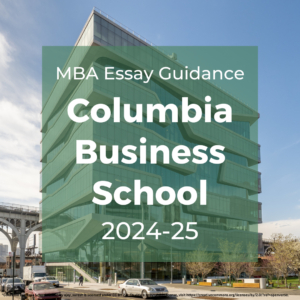2025-26 MBA Admissions: Trends Defining the Class of 2028
October 1, 2025
Read MoreSeptember 6, 2024

Examples of possible responses:
Find a way to include as much specificity and differentiation as possible in the goal statement given the character limit. Don’t just settle for a lazy/short/generic goal statement like ‘management consulting at M/B/B’.
Through your resume and recommendation, we have a clear sense of your professional path to date.
Columbia is unusual in that, for eight years, it has separated its goals essay from its Why Our School? Essay. That means you have potentially up to 500 words to describe your goals. However, Admitify doesn’t recommend that for most clients. Do focus 50-74% of your word count on your post-MBA goals (long-term end-game goal including potential job titles and org names and short-term Plan A and Plan B goals– Columbia loves to hear about backup plans). But then use the rest of the essay to relevant value-adding content. For example, the experiences that led you to these goals whether those experiences are personal or professional. Alternatively (or in addition, depending on how much word count you used to describe your goals) you could describe accomplishments that are relevant to your goals (you could frame these accomplishments as having helped you identify or refine your goals.
The Phillips Pathway for Inclusive Leadership (PPIL) is a co-curricular program designed to provide students with the skills and strategies needed to develop as inclusive leaders. Through various resources and programming, students explore and reflect on the following five inclusive leadership skills: Mitigating Bias and Prejudice; Managing Intercultural Dialogue; Addressing Systemic Inequity; Understanding Identity and Perspective Taking; and Creating an Inclusive Environment.
In many ways this is a classic accomplishment essay (situation/context—>your actions/EQ/problem-solving—>outcome (happy ending + lessons learned). What’s different is the DEI twist. Columbia, as are other schools, is signaling its institutional interest in this urgent social/business issue. Happily, they’re giving you 5 possible sub-themes to choose from (because they know not everyone has been or is expected to be on their firm’s DEI team). Applicants who have been DEI champions at or outside of work may gravitate toward an example relevant to Creating an Inclusive Environment or Addressing Systemic Inequity. The first is asking for a direct DEI scenario; the second could work for someone who has championed broader issues of inequity (e.g., socioeconomics), even if that latter scenario had no overt diversity element. Applicants who are themselves diverse applicants and perhaps particularly those who are LGBTQ may lean toward the Understanding Identity and Perspective Taking skill (e.g., how did you break the silence around the diversity issue you faced?). Those applicants who are not traditionally considered ‘diverse’ may gravitate toward the Mitigating Bias and Prejudice skill (e.g., how did you work to offset your own bias?) or the Managing Intercultural Dialogue skill (which need not involve diversity, identity, or bias at all — e.g., how did you simply demonstrate the EQ to build a bridge between different folks?). Don’t fret if you are not in a diverse applicant group traditionally defined. Columbia’s inclusion of the bias and difficult conversations as well as its reference to ‘ethical leadership’ show that they are open to any examples that show you demonstrating EQ/emotional intelligence, good values, or integrity/ethics in a way that makes groups or organizations function more openly.
We believe Columbia Business School is a special place with a collaborative learning environment in which students feel a sense of belonging, agency, and partnership–academically, culturally, and professionally.
Columbia is signaling very clearly what it wants applicants to emphasize in this essay: collaboration, belonging, and partnership. The words ‘agency’ and ‘co-create’ tell you that Columbia wants to see student initiative/proaction in helping to create these values of collaboration, belonging, and partnership. So, identify the Columbia resources in each of the three buckets that Columbia offers — academics (e.g., courses, etc.), ‘culture’ (e.g., extracurriculars, etc.), professional resources (e.g., internships, etc.) – that resonate most with your own unique differentiators and goals as a person/applicant. Describe how you will leverage these resources to create collaboration, belonging and partnership in the specific areas where you will engage with Columbia.
Columbia is not restricting you to only extenuating circumstance (grades, GMAT, etc.) discussions here, but they are limiting you somewhat to ‘areas of concern.’ But many things – such as your age, leadership or extracurriculars – could be framed as areas of concern. Feel free to discuss multiple areas of concern but separate them into separate paragraphs with headers/titles.